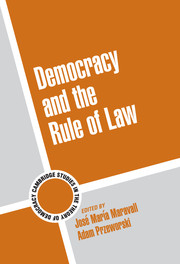Book contents
- Frontmatter
- Contents
- List of Contributors
- Acknowledgments
- Introduction
- Part I
- Part II
- 6 The Majoritarian Reading of the Rule of Law
- 7 How Can the Rule of Law Rule? Cost Imposition through Decentralized Mechanisms
- 8 Dictatorship and the Rule of Law: Rules and Military Power in Pinochet's Chile
- Part III
- Author Index
- Subject Index
8 - Dictatorship and the Rule of Law: Rules and Military Power in Pinochet's Chile
Published online by Cambridge University Press: 09 November 2009
- Frontmatter
- Contents
- List of Contributors
- Acknowledgments
- Introduction
- Part I
- Part II
- 6 The Majoritarian Reading of the Rule of Law
- 7 How Can the Rule of Law Rule? Cost Imposition through Decentralized Mechanisms
- 8 Dictatorship and the Rule of Law: Rules and Military Power in Pinochet's Chile
- Part III
- Author Index
- Subject Index
Summary
Should we associate the rule of law only with democratic legal systems or can we conceive of the rule of laws as an independent phenomenon that may equally be associated with other forms of regime? In particular, can we speak of an autocratic or dictatorial rule of law? In this chapter, I discuss two notions of the rule of law and argue that in principle, under specific conditions, both are compatible with nondemocratic forms of rule. Although this association may not be historically all that common, I analyze one case, the military dictatorship in Chile (1973–90), and try to show that a form of rule of law was operative within the regime, particularly during the last nine years of military rule. In developing this argument, I hope to elucidate some general properties of the rule of law and specify conditions under which rules can have force even upon their own makers.
Two Notions of the Rule of Law
The term “rule of law” is used quite widely in contemporary theoretical and political discussions. Nevertheless two broad conceptions are prominent. One, variously referred to as a “narrow,” “formal,” or “instrumental” conception of the rule of law, examines the formal characteristics that law must have if a legal system is to provide a nonarbitrary framework around which subjects can form expectations and live their lives. This notion of the rule of law essentially concerns the character of law as a mechanism of mediation between state authorities and social actors.
- Type
- Chapter
- Information
- Democracy and the Rule of Law , pp. 188 - 220Publisher: Cambridge University PressPrint publication year: 2003
- 17
- Cited by



